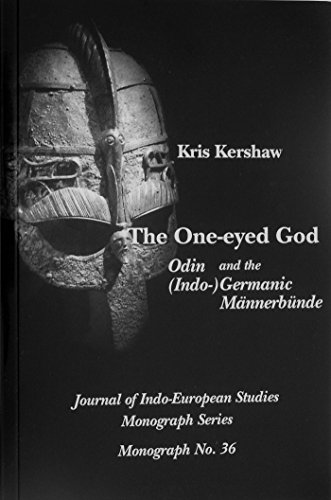The One-eyed God: Odin and the (Indo-) Germanic Männerbünde (Journal of Indo-European Studies Monograph No. 36)
Kris Kershaw
About the Book
Description:
Buy with confidence! Book is in new, never-used condition 0.75. Seller Inventory # bk0941694747xvz189zvxnew
About this title:
Synopsis: This is much more than just solid, factual information about Odin and the people whose deity he was, for Odin was the god of the Einheriar, of the Germanic and Viking mannerbunde, the furor Teutonicus and the war bands of the great folk wandering that shaped so much of the map of Europe as we know today. Here we have a broad and fascinating account of the Germanic ancestor cult, of the Wild Hunt, the eye in the well, wolf-men and werewolves, dragon-slayers, demon riders and Harlequin, Valhalla and Ragnorak. Odin/Wodan is presented to us as a divinity who was central to a warrior society the ramifications of which went far beyond the revered One-Eyed God of battle and knowledge. Organized into three sections, we are carried in the last of these far beyond Germany to find parallel institutions surviving amongst the wider Aryan kindred - among the Celts, Romans, Slavs and ancient Greeks, and still further, to the Indo-Aryans of Iran and the distant lands beyond the Indus, all sharing elements of a once common ancestral origin.
From the Publisher: Abbreviations; Glossary. THE EYE IN THE WELL: grandaevus altero orbus oculo; Odin's pledge; Heiti relating to Odin's eyesight; Blindr; Other possible heiti; "Blind," not "the blinder"; Other depictions of Odin/Wodan; Snorri and Saxo; Wodan, Woden, et. al; Iconography; Odin the Wolf god; An overview of the book; PART I. HERJANN: THE EINHERIAR: Snorri's description of the Einheriar; The word einheriar; Herr and Herjann; PIE *koryonos; Thor Einheri and the Einheriar. DER SCHIMMELREITER: The Host and the Hunt; Legend, myth, and cult; The matter of the Männerbund; The Dead and the living; Age sets and ancestor cult; Masks; Masks and ancestor cult; Demon horses; The Rider god; The Ancestors bring blessings; Feasts of the Changing Year; Harlequin. FERALIS EXERCITUS: Harii; Chatti; Weihekrieger; Civilis; Haraldr Hárfagr; The hairstyles of the Suevi; Procopius and Ammianus on youthful warriors; An analog from Doric Greece; The liminal state (marge); Exiting marge; Demon warriors; An initiation scenario in Völsungasaga; Dæmon warriors among the Chatti; Two armies of the dead; Mercurius; Hermes at the boundaries of space and time. FUROR TEUTONICUS: *wop ; Ódr; Ódinn; The suffix no ; Examples; A "Führersuffix"?; The suffix no in divine names; Poets' god and Rune master; Ecstasy, Possession, Inspiration, Madness; Ecstasy; Furor heroicus; War dances; Dancing gods; Mysterium and Mimus in the Anabasis; The sword dance in Germania; Mars and the Salii; KoúrhteV, Kour»teV, KorúbanteV; The Maruts; Some conclusions; Verat...r; PART II. THE INDO EUROPEAN MÄNNERBUND: *TEUTÁ AND *KORYOS: Equites and pedites; Village and Forest. THE *KORYOS: Raubrecht; The Manes; Animal transformations; `´EkstasiV; Times and seasons; Festivals; Seasonal activities; Sub groups; Small bands; Groups of 50; Older *koryos bündler; Weihekrieger; Men without property; Robbers and riff raff; Männerbund and Gefolgschaft. CANIS AND THE *KORYOS: Wolf and Dog; Ethnonymns and Männerbünde; "Wolf" men as founders of city states; An historical example; Mythical foundation stories a) The founding of Rome b) Caeculus and the founding of Praeneste; The ver sacrum; Cyrus, the founder of the Persian Empire; Wolf folk and Dog folk; Ethnic names a) Wolf folk of Anatolia b) An Ossetian wolf clan c) Other wolf folk d) Dog folk e) Hundingas and Ylfingar; Wolf priests a) Hirpi Sorani b) Some Hittite cult functionaries; Mythical ancestors a) Miletos b) Lamissio, king of the Langabards c) The Welfs of Swabia; Wolf men and Dog men; The Lombards; Germanic wolf names; Irish dog and wolf names; Greek heroes with wolf names; Wolf and dog men of the Scythians; Slavic wolf men; Kunokéfaloi a) "Zu den litauischen Werwölfen b) Slavic dog heads c) Survivals of the kunéh/ lukéh; 'Alkim«tatoi kúneV; "Ver sacrum bei den [Indo ]Germanen?"; Canine/ lupine qualities; ODIN ANALOGS: India; Iran; The Ossetes; The Celts; The Balts and Slavs; Greece; Italy; Mars; Faunus; Veiovis; *teutá god and *koryos god; Un rite d'agrégation; PART III. THE VRÁTYAS: WARRIOR BRAHMINS: An oath brotherhood; Vratya clothing and weapons; Seasonal activities; The brahmacárin; The education of a brahmin; The vrátyastoma; Vrátyastoma and sattra; Sattra; Daksiná; Vrátyas and sattrins; RUDRA: Rudra's armies; Ganapati; The rudras; The Maruts; A troop; The Maruts are both like and unlike Rudra; The Maruts as * koryos; I Ir. *marXa; Marut epithets; Priestly activities; War god; The Wild Hunter; Canis; Dogs and the Lord of Dogs; Dasará; Le jeu du Cheval; Têtes coupées; The hunter with the spear; Some conclusions; Death; Fertility; Ekstasis; The Feast of the Changing Year; The Dragon Slayer; Initiation; Natarája; The Ekavrátya; CHOOSING A LEADER: The Súlagava sacrifice; Two stories; The vrátyas as rudras; The dice game in early India; The "dice"; How it was played; An army of dice; The dog and the dog killer; Kali, the dog; Kali eko'k§ah and ekák§a; The One and the Dog; The ritual dice game; senánír maható ganásya; Sabhá and irina; Sabhá and solstice; Herjann; Excursus--The Vrátyastomas; DARKNESS, DOGS, AND DEATH: Conclusion--The Wolf god and the Eye in the Well; Bibliographies; Primary Sources; Works Cited; Index.
Bibliographic Details
Title: The One-eyed God: Odin and the (Indo-) ...
Publisher: Institute for the Study of Man
Publication Date: 2000
Binding: Soft cover
Condition: New
